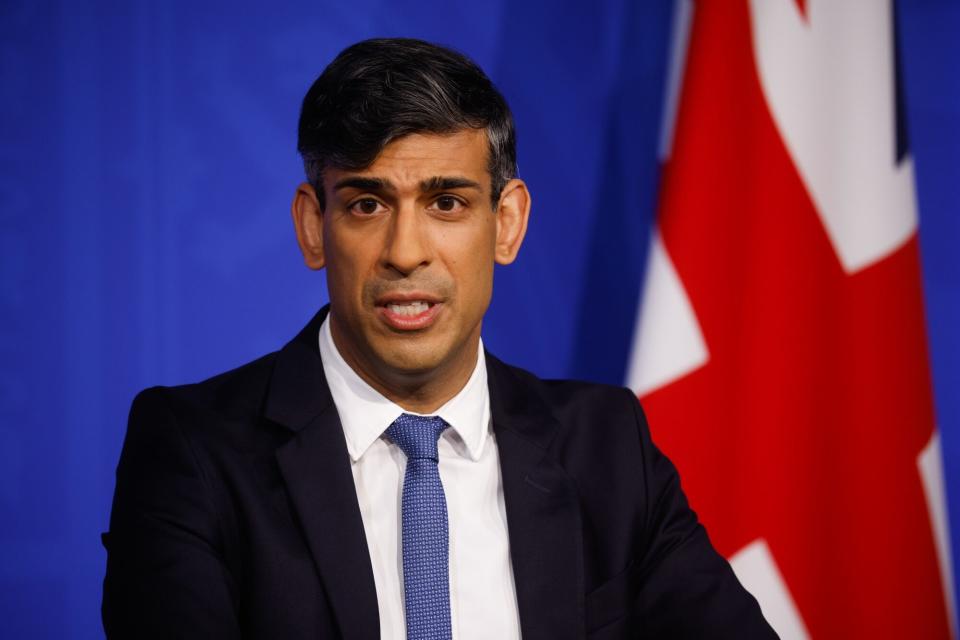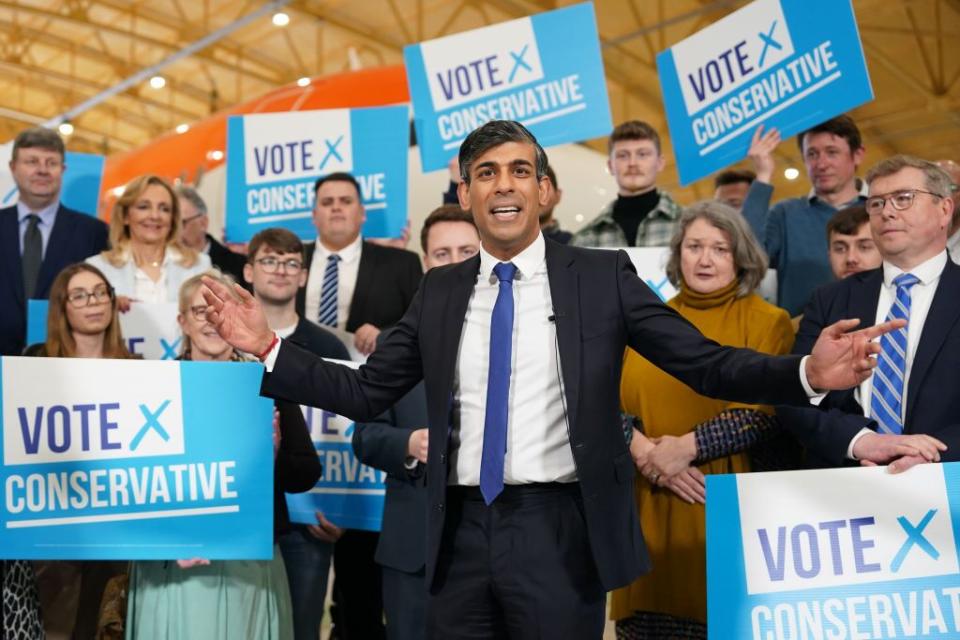Tories Press Sunak to Move to Right After Local Election Rout
(Bloomberg) -- UK Prime Minister Rishi Sunak is facing calls from Conservative lawmakers to adopt an immigration cap, as he comes under pressure to move his party further to the right after it was routed in last week’s local elections.
Most Read from Bloomberg
Jack Dorsey Leaves Bluesky Board, Calls X ‘Freedom Technology’
At $2 Million Per Minute, Treasuries Mint Cash Like Never Before
S&P 500 Extends Gains in Final Minutes of Trading: Markets Wrap
While internal critics of Sunak decided against trying to replace him, prominent party members renewed their attacks on the leader after the Conservatives lost almost half the local council seats they were defending. Keir Starmer’s resurgent Labour Party also won 10 out of 11 mayoralties up for grabs, increasing its vote share in London and toppling the popular Tory mayor Andy Street in the West Midlands by just 1,500 votes.
Now, Sunak is facing calls to consider policies including an immigration cap and a withdrawal from the European Court of Human Rights, even though the prime minister has urged the party to “stick to the plan” ahead of a general election expected in the second half of the year. Although many of its seats were captured by Labour and other left-leaning parties such as the Liberal Democrats and the Greens, some Conservatives worry the populist Reform UK founded by Brexit-campaigner Nigel Farage poses a bigger threat.
Former Home Secretary Suella Braverman said during an interview with the BBC that she regretted backing Sunak to become prime minister in 2022, although she stopped short of calling for a new leader. She criticized the government’s failure to make a “bold offer” of tax cuts to voters and said Sunak needs to put a cap on legal European migration and pull the UK out of the ECHR.
“The plan is not working and I despair at these terrible results,” said Braverman, who’s among several past and present Sunak cabinet officials mentioned as possible successors.
Former Immigration Minister Robert Jenrick is set to publish a pamphlet this week urging more action to bring down migration before the election, according to a person familiar with his plans. Andrea Jenkyns, a Tory MP and former minister who submitted a letter of no confidence against Sunak in November, separately exhorted the prime minister to take a “really strong” stance on illegal immigration and push ahead with plans to deport migrants to Rwanda.
“He’s staring down the barrel of a gun,” Jenkyns said on Sky News. “We’ve got to actually start delivering true conservative values.”
Sunak’s team said he would attempt to fight back with a series of media appearances and policy announcements in the days ahead, focusing on the economy, migration and healthcare. Tory officials said they would seek to argue in the election campaign that there was a risk of a Labour coalition government with the Scottish National Party, Liberal Democrats or Greens if Starmer’s party failed to secure a majority.
“These were disappointing results, but the point is what they demonstrate from that scenario is that Labour is not on course for that majority, Keir Starmer hasn’t sealed the deal with the public,” Transport Minister Mark Harper told Sky News, speaking for the government.
Allies of the prime minister are embracing an analysis by local elections expert Michael Thrasher that projects Labour’s advantage in the national vote at just 7 percentage points, well short of what the party expects to need to win an outright majority. However, some polling experts caution against drawing firm conclusions about what local elections mean for general elections, due to differing match-ups with independent parties and tactical decisions by voters.
Sunak on Sunday conceded that the Conservatives was on course to lose its majority, but warned that a Starmer premiership that’s propped up by other parties would be a “disaster” for the UK.
“The country doesn’t need more political horse trading, but action,” Sunak told the Times newspaper. “We are the only party that has a plan to deliver on the priorities of the people.”
The prime minister has some breathing room after internal critics called off a planned effort to depose him after last week’s votes. While the Tories lost 473 seats, it avoided a wipeout, after Ben Houchen, the popular mayor of Tees Valley, held his seat and the Labour opposition was denied victory in a crucial London suburb of Harlow in Essex.
Read More: Tories Drop Bid to Oust Sunak After He Avoids Election Wipeout
The calls to move further to the right are familiar to Sunak, who has lurched between populist and centrist rhetoric as his government rolls from crisis to crisis. After a failed rebellion against his Rwanda policy, which some harder-line Tories deemed too weak, he turned his focus back to the economy and tax cuts, arguing that the Conservatives’ fortunes would improve as election day neared.
In the run-up to last week’s elections, Sunak pledged to hold the first deportation flights to Rwanda by July and vowed to increase defense spending to 2.5% GDP by 2030 — policies aimed at fending off potential leadership rivals. Through it all, support for the Conservatives has only declined, with voters seeking change after 14 years of Tory rule.
Still, some Conservatives argue that the party faces a more secure future by seeking the middle ground. They point to London Mayor Sadiq Khan’s decisive victory over Susan Hall, who had expressed support for former US President Donald Trump and ran a populist campaign focused on crime and opposition to the city’s low-emissions zone.
Street, the Tories’ defeated mayoral candidate in the West Midlands, told Sky News that he only came so close to winning reelection because his campaign presented a “moderate, inclusive and tolerant” message. “That is what the Conservative Party should concentrate on, not the personality politics,” he said.
Most Read from Bloomberg Businessweek
Chris Dixon’s Campaign to Overhaul Crypto’s Grifty Reputation
AI Is Helping Automate One of the World’s Most Gruesome Jobs
©2024 Bloomberg L.P.





